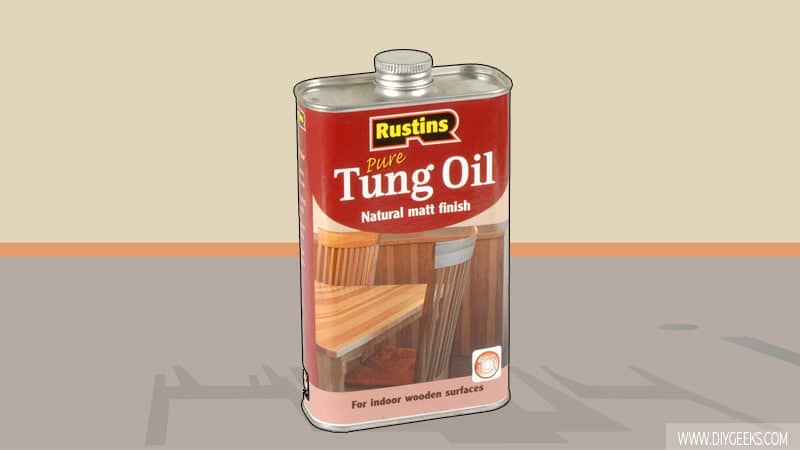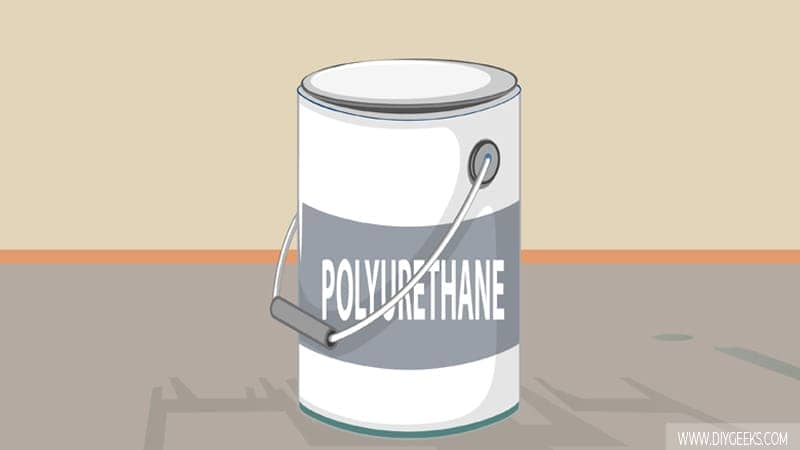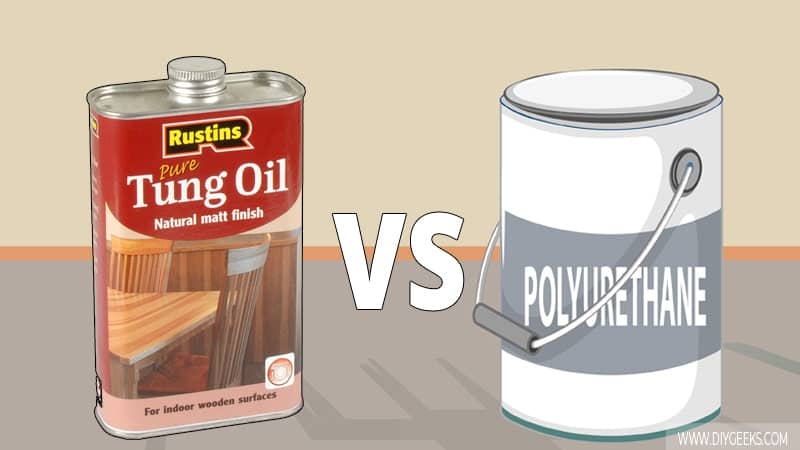Tung oil is a natural wood finish that produces an amber-like color shade and offers low protection to surfaces. Polyurethane is a protective coating that forms a moisture-resistant layer (barrier) over the surface and protects it.
Polyurethane forms a transparent finish that protects the surface, lasts longer, costs less, has better moisture resistance, and is easier to clean than Tung oil. Tung oil forms an amber-like color shade finish that penetrates and adheres to surfaces better.
What is Tung Oil?

Tung oil is a natural wood finish obtained from the Chinese Tung Tree (Aleurites fordii or Vernicia fordii) seeds. It penetrates the wood pores and forms an amber-like (or gold) color shade that enhances the wood’s natural appearance.
Tung oil has low moisture-resistance levels and is used for interior wooden surfaces. It takes tung oil around 24 hours to dry between coats and 3 days to cure (dry fully).
You need between 2-6 Boiled Tung oil coats for proper coverage, durability, and strength. You must re-apply (touch-up) it every year because this wood oil isn’t durable and wears off fast. This means you shouldn’t use it for high-traffic surfaces.
You can use Tung oil for the following things.
- To get a wood finish with an amber-like color shade.
- To reveal the wood grain.
- Over wood décor and sculptures to reveal the details and carvings in the wood.
What is Polyurethane?

Polyurethane is a synthetic protective coating used to protect surfaces from moisture, water, scratches, and weather elements. It forms a glossy transparent finish that reveals the underlying surface.
There are two polyurethane types; water-based and oil-based. Both offer good durability and strength and protect several surfaces from damage.
You can use polyurethane for the following things.
- To seal painted or stained surfaces.
- To protect wooden surfaces from water or moisture.
- To protect outdoor surfaces from weather elements.
- To protect floors from scratches.
Polyurethane vs Tung Oil
The differences between polyurethane and Tung oil are listed below.
Surface Adhesion
Tung oil adheres to wooden surfaces better than polyurethane as it penetrates the wood pores deeply. Since Tung oil penetrates wood pores deeply, it’s harder to remove it without damaging the wood.
Polyurethane adheres over the wood top layer without penetrating the wood pores, so it’s removed more easily.
Wood Protection
Polyurethane protects wood better than Tung oil as it forms a moisture-resistant layer (barrier) that protects underlying surfaces from moisture, water, scratches, and other elements.
Tung oil doesn’t protect wood as much as it doesn’t have a highly moisture-resistant hard finish. Its finish is prone to scratches, stains, and water rings.
Durability
Polyurethane finish lasts longer than Tung oil as it’s more durable, harder, stronger, and has a glossy moisture-resistant finish that prevents water penetration.
Polyurethane lasts around 10 years, while Tung oil doesn’t have more than 2 years.
The Color
Polyurethane forms a colorless (transparent) finish, while Tung oil forms an amber-like (gold) color shade finish.
Normal polyurethane forms a colorless (transparent) finish that doesn’t affect the underlying surface or paint color shade. Tinted polyurethane forms a colorful finish that covers the underlying surface or paint color shade.
Tung oil forms an amber-like (or gold) color shade over the surface, enhances the wood appearance, and reveals the wood grain.
Application
Polyurethane is easier to apply over large surfaces, while Tung oil is easier to apply over small surfaces.
To apply polyurethane you can use a paint sprayer, brush, roller, or rag. It also comes in ready-to-use spray cans. To apply Tung oil, you wipe it over the wooden surface with a rag.
Price
Polyurethane costs less than Tung oil as it’s easier to manufacture.
Tung oil has a higher price because is harder to manufacture as it’s gotten from a Tung tree that is native to China only. It also goes through processing to make it lighter as raw Tung oil takes too long to dry.
Moisture Resistance
Polyurethane offers better moisture resistance than Tung oil as it’s formulated with more protective additives that form a plastic-like finish over the surface and prevent water penetration.
Tung oil offers low moisture-resistance qualities and can get removed if exposed to constant water or moisture.
Cleaning and Maintenance
It’s easier to clean and maintain a polyurethane finish than Tung oil because the sealer doesn’t absorb stains, dirt, or dust, and you can use a liquid-based cleaner without damaging its finish.
Tung oil is harder to clean and maintain as it has a softer finish that accumulates dirt and filth while and after drying, you must clean it more often, and it doesn’t have a high moisture-resistant finish that prevents water penetration so you can’t use liquid-based cleaner.
Which One Do You Need?
It’s difficult to choose between these two finishes, but here are a few factors to consider to make your decision easier:
- Budget: Use polyurethane if you have a low budget as it costs less.
- Moisture-resistance: Use polyurethane if you need a finish with high moisture-resistant qualities to protect the underlying surface from moisture or water.
- Wood Protection: Use polyurethane if you want to protect wooden surfaces from moisture, scratches, or weather elements.
- Color: Use Tung oil or Tinted polyurethane if you want a colorful finish that protects the wooden surface.


